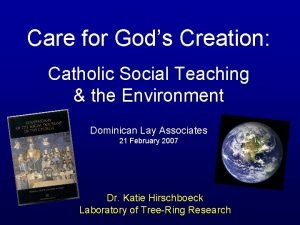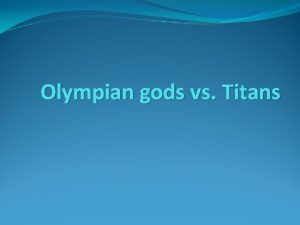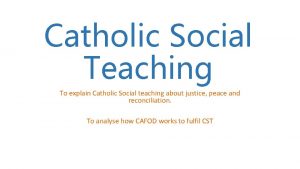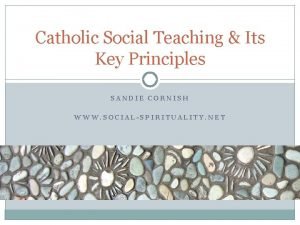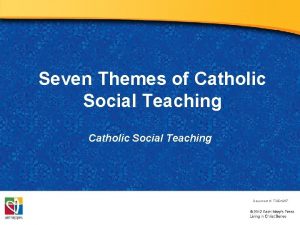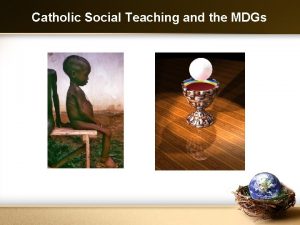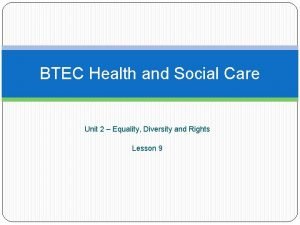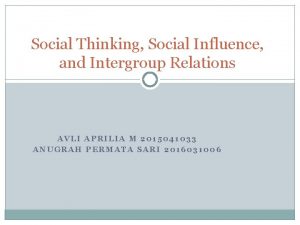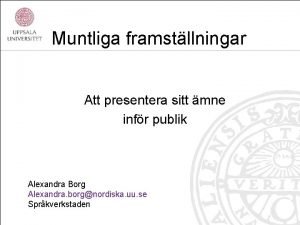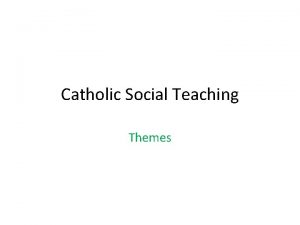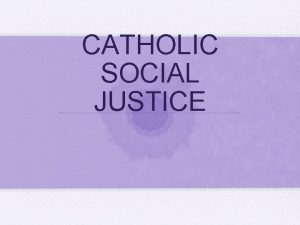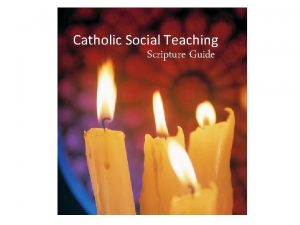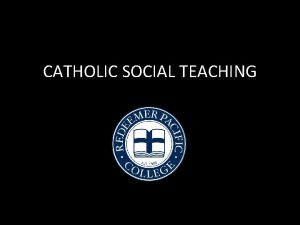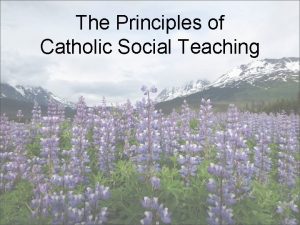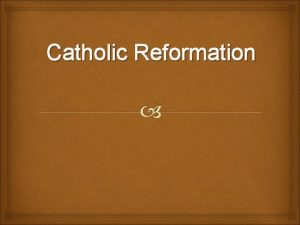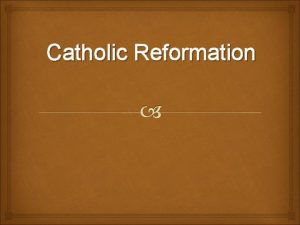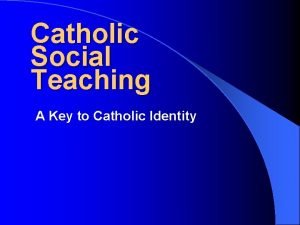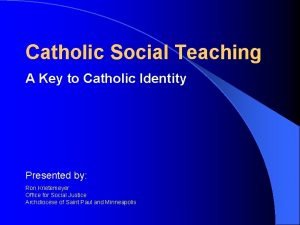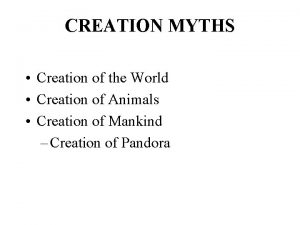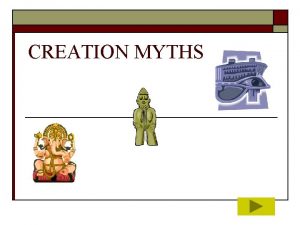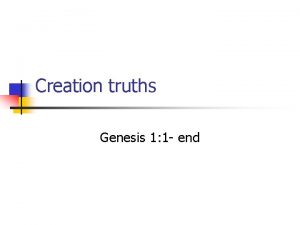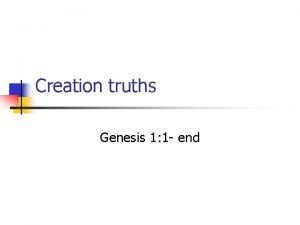Care for Gods Creation Catholic Social Teaching the




































- Slides: 36

Care for God’s Creation: Catholic Social Teaching & the Environment Dominican Lay Associates 21 February 2007 Dr. Katie Hirschboeck Laboratory of Tree-Ring Research

Care for God’s Creation: Catholic Social Teaching & the Environment • Mini-Overview of Catholic Social Teaching (CST) • Key documents & evolution of the connection between CST and the environment • Closing thoughts on the role of Science Key source: Silecchia, Lucia A. (2004) Environmental Ethics from the Perspectives of The National Environmental Policy Act (NEPA) and Catholic Social Teaching: Ecological Guidance for the 21 st Century: William and Mary Environmental Law and Policy Review 28: 659 -798

Catholic Social Teaching (CST): Rooted in Scripture & Judeo-Christian Tradition BOOK OF GENESIS CREATION STORIES: Dignity of Human Person – created in image and likeness of God Gn 1: 26

Rooted in Scripture & Judeo-Christian Tradition BOOK OF GENESIS CREATION STORIES: - Creation is good Gn 1: 31 "Be fertile and multiply; fill the earth and subdue it. Have dominion over. . . all the living things that move on the earth. " Gn 1: 28 - - Humanity charged to “cultivate and care” for creation Gn 2: 15

Story of Noah Relationship between human wrong and resulting harm to the rest of humanity & all creation God’s Covenant with humanity I set my bow in the clouds to serve as a sign of the covenant between me and the earth. Gn 9: 13 Sabbatical & Jubilee Years Let the lands lie fallow, bring good news to the oppressed, set slaves free & proclaim liberty to captives; forgive debts “a kind of social doctrine in miniature”

Other spiritual roots: -- Ancient connections between faith, work and seasonal rhythms of agrarian communities -- Early Church: “all held in common” -- Middle Ages: -- land work seen as part of God’s creation, subject to religiously inspired ethical standards -- Nature viewed as gift; land belonged to God not humans -- community of property, care & protection of poor in society responsibility of church -- St. Francis – “Patron Saint of Ecology” -- care for the natural world -- care for humanity; love for the poor “Perhaps the most inspiring role for Francis as patron of the environmental movement would be to join ecology with an option for the poor. ” [Drew Christiansen, 1991)

Modern Catholic social teaching has been articulated through a tradition of papal, conciliar, and episcopal documents. . . The Church's social teaching is a rich treasure of wisdom about building a just society and living lives of holiness amidst the challenges of modern society.

U. S. Conference of Catholic Bishops http: //www. usccb. org/sdwp/projects/ socialteaching/excerpt. htm (1999) Compendium Of The Social Doctrine Of The Church by Pontifical Council For Justice And Peace (2004)

THE SEVEN KEY THEMES OF CATHOLIC SOCIAL TEACHING 1 – Sacredness of Life & Dignity of the Human Person The Catholic Church proclaims that human life is sacred and that the dignity of the human person is the foundation of a moral vision for society. Our belief in the sanctity of human life and the inherent dignity of the human person is the foundation of all principles of our social teaching.

THE SEVEN KEY THEMES OF CATHOLIC SOCIAL TEACHING 2 -- Call to Family, Community, and Participation The person is not only sacred but also social. How we organize our society in economics and politics, in law and policy directly affects human dignity and the capacity of individuals to grow in community. The family is the central social institution We believe people have a right and a duty to participate in society, seeking together the common good and wellbeing of all, especially the poor and vulnerable.

THE SEVEN KEY THEMES OF CATHOLIC SOCIAL TEACHING 3 – Rights and Responsibilities The Catholic tradition teaches that human dignity can be protected and a healthy community can be achieved only if human rights are protected and responsibilities are met. Therefore, every person has a fundamental right to life and a right to those things required for human decency. Corresponding to these rights are duties and responsibilities to one another, to our families, and to the larger society.

THE SEVEN KEY THEMES OF CATHOLIC SOCIAL TEACHING 4 – Option for the Poor and Vulnerable A basic moral test is how our most vulnerable members are faring. In a society marred by deepening divisions between rich and poor, our tradition recalls the story of the Last Judgment (Mt 25: 31 -46) and instructs us to put the needs of the poor and vulnerable first.

THE SEVEN KEY THEMES OF CATHOLIC SOCIAL TEACHING 5 – The Dignity of Work and the Rights of Workers The economy must serve people, not the other way around. Work is more than a way to make a living; it is a form of continuing participation in God's creation. If the dignity of work is to be protected, then the basic rights of workers must be respected the right to productive work, to decent and fair wages, to organize and join unions, to private property, and to economic initiative.

THE SEVEN KEY THEMES OF CATHOLIC SOCIAL TEACHING 6 – Solidarity We are our brothers' and sisters' keepers, wherever they live. We are one human family, whatever our national, racial, ethnic, economic, and ideological differences. Learning to practice the virtue of solidarity means learning that "loving our neighbor" has global dimensions in an interdependent world.

THE SEVEN KEY THEMES OF CATHOLIC SOCIAL TEACHING 7 – Care for God's Creation We show our respect for the Creator by our stewardship of creation. Care for the earth is not just an Earth Day slogan, it is a requirement of our faith. We are called to protect people and the planet, living our faith in relationship with all of God's creation. This environmental challenge has fundamental moral and ethical dimensions that cannot be ignored.

Kindness and truth shall meet, justice and peace shall kiss. Ps 85: 11 Works of Charity Works of Justice Social Service Social Change Scriptural Reference: Good Samaritan Story The Gospel story does not attempt to survey the causes of highway banditry. The Samaritan provides temporary and immediate relief. Private, individual acts Responds to immediate need Provides direct service: food, clothing, shelter Requires repeated actions Directed at the effects of injustice: symptoms Scriptural Reference: Exodus Story Moses does not ask for food and medicine for the Jewish slave-labor force. He challenges the institutional system. "Let My People Go. " Public, collective actions Responds to long-term need Promotes social change in institutions Resolves structural injustice Directed at the root causes of social injustice Examples: Homeless shelters, food shelves, clothing drives, emergency services Legislative advocacy, changing corporate policies or practices, congregation-based community organizing.

Modern ecological concerns -- Intergenerational responsibility & its environmental implications -- Environmental sustainability & population control Pope John XXIII Pope Leo Primacy of XIII humanity over Rerum Novarum creation “Of New Things” Mater et Magistra Reiterates rights & Human rights & “Mother and Teacher” responsibilities, of war, On Christianity & effects Social Progress addressed to (1961) whole world: inclusiveness, science’s ability to address environmental Pacem in Terris “Peace on Earth” (1963) problems Pope Pius XI The Condition of Labor responsibilities private(1891) Quadragesimo Anno attached to private property (40 th anniversary of Rerum property use common good Novarum) Vatican II First to address environment On Reconstructing the separate. Gaudium from other social importance et Spes Social Orderof (1931) gifts from God for concerns; “Joy holistic view: common good and Hope” benefit of all humanity is out of. Modern harmony with The Church in the World all created things. (1965)

Natural. Pope resources limited Johnare Paul II Development & environmental risks, justice & Laborem Exercens “On Human Work” (1981) sustainability Sollicitudo Rei Socialis Global human solidarity: mutual connection, “Onvision Socialof. Concern” (1987) “being is more than “having” Broad view of development beyond economic progress, Pope Paul VI must promote good of every person & the Populorum Progressio whole person “On the Development of Peoples” (1967) Peace With The Creator, Peace with All of Creation (1990 ) Nonrenewable resources & future generations Centesimus Annus th Anniversary Environmental is a moral problem (On the 100 problem of Rerum Novarum) (1991) Human dignity, lack of respect for life in patterns of Tertio Millenio Adveniente environmental degradation “On the Coming of the Third Millennium” Management of earth’s goods – subsidiarity ( 1994) Beginning of realization Human right to a safe environment (poverty, war) Evangelium Vitae that destruction of Octogesima Adveniens “The Gospel of Life” (1995) Courage to adopt a new life-style nature itself a real (On the 80 th Anniversary of possibility; Rerum concerns Novarum) “Declaration on the Environment: We - goodness of creation (1971) entire human family are Still Betraying the Mandate God Has - centrality of. Given human Us” person - at its(Venice core, the environmental Declaration 2002) with Patriarch I of Constantinople crisis. Batholomew reflects moral failing

Pope Benedict XVI Inaugural homily: U. S. “The Conference earth’s treasures no longer serve to build God’s garden for all to live in, but they of Catholic Bishops have been made to serve the powers of exploitation and destruction. ” “Brothers and Sisters to Us” (1979) “Statement on Capital Punishment” (1980) Based on writings as Cardinal: “The Challenge of Peace” (1983) -- Creation is a vital manifestation of the Creator “Economic Justice for All” (1986) -- Liturgical life and natural life are closely linked Sociallyhas Responsible -- Technology power to. Investment both aid and harm Guidelines (1991) the environment -- Humanity must bethe respected in proposed Renewing Earth (1991) environmental law Global Climate Change: A Plea for Dialogue, Prudence, -- War has aand destructive impact the Common Good (2001) Pope Benedict XVI Deus Caritas Est “God is Love” (2006)

Pope Benedict’s World Day of Peace Message 1 January 2007 “The Human Person, The Heart of Peace” • Humanity, if it truly desires peace, must be increasingly conscious of the links between natural ecology, or respect for nature, and human ecology. • Experience shows that disregard for the environment always harms human coexistence, and vice versa. • It becomes more and more evident that there is an inseparable link between peace with creation and peace among men. Both of these presuppose peace with God. The poem-prayer of Saint Francis, known as ‘the Canticle of Brother Sun’, is a wonderful and ever timely example of this multifaceted ecology of peace. ”

US Conference of Catholic Bishops (USCCB) Renewing the Earth: An Invitation to Reflection and Action on the Environment in Light of Catholic Social Teaching (1991) Seven principles upon which environmental policy should be based: 1. Adopting a God-centered & sacramental view of the universe 2. Maintaining respect for human life, which extends to respect for all creation 3. Adopting a worldview affirming the ethical significance of global interdependence & the common good 4. Pursuing ethics of solidarity 5. Respecting the universal purpose of created things 6. Advancing an option for the poor 7. Advocating authentic development that respects human dignity and the limits of material growth

Global Climate Change: A Plea for Dialogue, Prudence, and the Common Good (2001) Why bishops are entering the debate: - Much of debate seems polarized & partisan - Science too often used as a weapon - Various interests minimize or exaggerate the challenges we face - Search for the common good & the voices of poor people and poor countries sometimes are neglected - Seek to offer a word of caution and a plea for genuine dialogue Singles out United States as bearing a weighty responsibility in matter of environmental stewardship Outlines specific aspects of development linked to ecological policy

USCCB’s Environmental Justice Program

EJP’s Policy Framework: http: //www. usccb. org/sdwp/ejp/background/policy. html (1) environmental justice: defined as the strong link between social justice and environmental protection emphasizing the needs of the poor (2) sustainable development: with an emphasis on social and economic development that not only protects the sustainability of natural resources but promotes a just distribution of these resources today and for future generations (3) worker protection: insisting that workers' needs should not be sacrificed at the expense of environmental protection or vice versa (4) the “commons: ” defined as protecting vital global shared resources such as the oceans, land, water and fisheries.

Regional & Local Initiatives. . . The Columbia River was the focus of an extensive pastoral letter project launched by 12 Catholic bishops of the Northwest and Canada EJP- sponsored local & regional projects: -- comprehensive vision, address multiple conditions, diverse constituencies -- address concrete issues linking social & economic justice with environmental protection -- engage citizen groups, reliable research -- integrate social teaching / education with direct public policy activity pastoral letter issued by the NW bishops in February 2001

USCCB’s newest EJP initiative: CLIMATE CHANGE JUSTICE AND HEALTH http: //www. usccb. org/sdwp/ejp/climate/index. shtml

SUMMARY ENVIROMENTAL PRINCIPLES GLEANED FROM CATHOLIC SOCIAL TEACHING (source: Silecchia, 2004) a) Human life and dignity must remain at the forefront of any consideration of environmental questions b) Stewardship * is the appropriate model for human care for the environment c) Obligations to future generations must influence environmental decision-making * One who cares for property and possessions that belong to others

d) In the spirit of subsidiarity* environmental decision-making must be made at the appropriate level e) The right to private property and the mandate to use property for the common good must both be respected in environmental policies f) Environmental concerns are also moral concerns which require radical rethinking of consumer culture * should resolve problems at the lowest possible level, but higher level must step in when needed or appropriate

SOME MOVEMENTS IN CATHOLIC SOCIAL TEACHING BEYOND THE ANTHROPOCENTRIC APPROACH -- affirmation of sacredness of all creation -- acknowledgement of interdependence of life in all its forms -- importance of thinking on behalf of future generations of ALL life forms -- environmental crisis is a moral crisis -- critique of market economics and unrestrained use of Earth’s resources -- ways toward integrating sustainable development as a foundation for Peace

“A summary of Catholic Social Justice teaching suggests the following themes for religious teaching and moral debate: • A God-centered and sacramental view of the universe which grounds human accountability for the fate of the earth. • A consistent respect for human life which extends to respect for all creation. • A world view affirming the ethical significance of global interdependence and the common good. from: New Mexico Catholic Conference “Partnership for the Future” http: //www. ncrlc. com/bishop-statements-webpages/newmexico. html

• An ethics of solidarity promoting cooperation and a just structure of sharing in the world community. • An understanding of the universal purpose of created things which requires equitable use of the earth's resources. • An option for the poor which gives passion to the quest for an equitable and sustainable world. • A conception of authentic development offering a direction for progress which respects human dignity and the limits of material growth.

Closing Thoughts on the Role of Science in CST and the Environment -- parallel development of CSTenvironment connection and scientific advances -- as in other areas, popes, bishops, etc. have invited the voice of science -- CST addresses vital issues beyond purview of science -- CST deepens and intensifies the need for science’s contributions and vision

Love—caritas—will always prove necessary, even in the most just society. This is where Catholic social doctrine has its place: . . . Its aim is simply to help purify reason and to contribute, here and now, to the acknowledgment and attainment of what is just. Prayer, as a means of drawing ever new strength from Christ, is concretely and urgently needed. It is time to reaffirm the importance of prayer in the face of the activism and the growing secularism of many Christians engaged in charitable work.


“The action. . . Is not national, and it often is not issue-driven. . [it] is going on locally, and the most pressing changes are occurring not in issues but in attitudes. . Catholics across the country are beginning to rethink how they relate to the Earth and to reevaluate their role in the ecological balance. Feb 13, 2006 issue After all, this is ecology, so the best way to go is organic, and the best way to start is from the ground up. ”

 Care for god's creation - catholic social teaching
Care for god's creation - catholic social teaching Titans vs gods
Titans vs gods Caritas australia catholic social teaching
Caritas australia catholic social teaching Cafod catholic social teaching
Cafod catholic social teaching Catholic social teaching
Catholic social teaching 7 themes of catholic social teaching examples
7 themes of catholic social teaching examples Key principles of catholic social teaching
Key principles of catholic social teaching Seven key themes of catholic social teaching
Seven key themes of catholic social teaching Levels of care primary secondary tertiary quaternary
Levels of care primary secondary tertiary quaternary Catholic teaching on poverty
Catholic teaching on poverty Health and social care values unit 2
Health and social care values unit 2 Church hierarchy
Church hierarchy Papal hierarchy
Papal hierarchy Papal hierarchy
Papal hierarchy Difference between microteaching and traditional teaching
Difference between microteaching and traditional teaching Social thinking social influence social relations
Social thinking social influence social relations Social thinking social influence social relations
Social thinking social influence social relations Formuö
Formuö Typiska novell drag
Typiska novell drag Tack för att ni lyssnade bild
Tack för att ni lyssnade bild Returpilarna
Returpilarna Varför kallas perioden 1918-1939 för mellankrigstiden?
Varför kallas perioden 1918-1939 för mellankrigstiden? En lathund för arbete med kontinuitetshantering
En lathund för arbete med kontinuitetshantering Adressändring ideell förening
Adressändring ideell förening Personlig tidbok fylla i
Personlig tidbok fylla i A gastrica
A gastrica Förklara densitet för barn
Förklara densitet för barn Datorkunskap för nybörjare
Datorkunskap för nybörjare Tack för att ni lyssnade bild
Tack för att ni lyssnade bild Att skriva debattartikel
Att skriva debattartikel Magnetsjukhus
Magnetsjukhus Nyckelkompetenser för livslångt lärande
Nyckelkompetenser för livslångt lärande Påbyggnader för flakfordon
Påbyggnader för flakfordon Kraft per area
Kraft per area Svenskt ramverk för digital samverkan
Svenskt ramverk för digital samverkan Jag har nigit för nymånens skära
Jag har nigit för nymånens skära Presentera för publik crossboss
Presentera för publik crossboss
